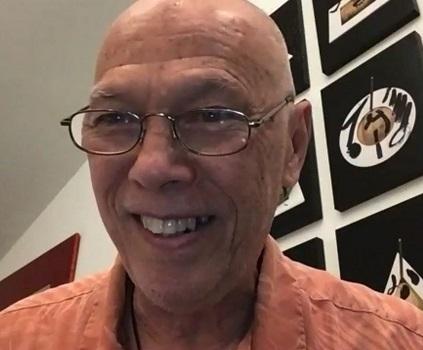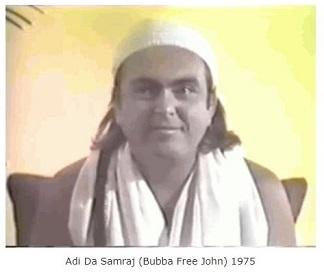Beezone Interview Series
with Stephan Blas
Session 8
The Deeper Process
“When push comes to shove”
Adi Da Samraj (Bubba Free John), 1975


The Deeper Process
“When push comes to shove”
Never Inspected, Never Understood
***
“It was only by allowing it to be so and fully experiencing ..this, that I could come eventually to perceive what is always and stably the underlying truth of all experience. All the latent imagery, necessity and unfulfilled devotional energy ..had been trapped in the heart since childhood. Only when these images were completely and consciously experienced, and the energy surrounding the heart utterly released ..could I remain stable in the true consciousness that is the heart of reality itself.”
Adi Da Samraj, Knee of Listening (1971), The Diary of My Pilgrimage
***
Ed: Recently, while telling other people about the leelas and stories while in the company of Adi Da you were conveying to them how you were seeing how the ego more than the devotee continued to show itself.
Stephan: There were times when I was confronted with something like an expose of certain things, especially as you and I discussed many times the area of feeling rejected and betrayed and abandoned. Sometimes it was a little bit more graceful where I could fall into the ‘wound of the heart’, and there actually be the release of energy and in a depthfulness of vulnerability in feeling. When I was able to do this it allowed me to feel the Guru with a depth of love in the midst of the wound of betrayal, heartbreak and such.
But there were other times in which I not only was not able to go to that deeper place, but reacted. I at times stood my ground, argued and even became disrespectful, acted like a real asshole believe it or not. I don’t think I’m exaggerating or overstating when I say this. I’m sure that you have been at times with a family member or dear friend when that has happened.
Listen to Stephan continue – click triangle

Ed: Let me just say for my audience here, that you have spoken a little bit about times when you were asked to leave the company of the Guru. And that is probably to me, the only time that you, if you will, argued or resisted or confronted Adi Da in any kind of, let’s say hurtful, where you were hurt, but you were more angry.
Stephan: I was like a rat in the corner.
Ed: Are you speaking, when you were telling those leelas the other day that those are the incidences that you’re referring to?
Stephan: Yeah.. They’re the same incidences. We actually talked about all this same incidences, I think there are three or four of them that are more major. Or five or six, I don’t know how many, but that were major where I would fall into this place. But I guess the difference in telling you the story and telling Stanley and Rachel, is that when I was speaking with you, we would pretty much just focus most of the time on one incident, one time period. We may have also mentioned and remembered another one that was similar and therefore we could weave that into the story. With Stanley and Rachel, it seems like I was able to hit on all of them almost from the beginning to the end. They literally were telling the exact same story, even though they were years apart, decades apart in some case.
It showed an even more, kind of a comprehensive purification that to me, it showed the Guru, his work, and the devotee. As I had mentioned to you, the process is always a re-examination and a reinspection at all the stages of life, continually. Every time there seems to be some kind of understanding and matured in a certain way, then it all starts again.
Ed: On these other incidences that you didn’t mention with me because of the focus of the dialogue, were they all surrounding times and the situations were they similar in the sense that you were asked to leave his company?
Stephan: Yes. Either I was asked to leave or given some kind of critical communication, which I responded to by removing myself. I can give you one example of how this lesson was literally from the beginning to literally the last time I actually spent time in Beloved’s physical human presence. You would think, “Okay, after 40 years, right, that someone matures and therefore has transcended some of their earlier stuff.“
“I don’t care how profound and spiritual you may assume yourself to be
– regardless of the years and the gifts”
If you look at the history of my relation to Beloved you would actually see different levels of practice, different levels of maturity and self-understanding. Yet, if there was still something that was not fully inspected. This something is going to rear its ugly head, regardless of what you’ve gone through or what you think you’ve understood. I don’t care how profound and spiritual you may assume yourself to be – regardless of the years and the gifts. I was able to feel this particular description of the process that Beloved has always revealed to us, even in the midst of his incredible magnificent seven stages of life and allowing us to even receive and feel and animate the highest stages of life.
Ed: What was the incident that you were referring to?
Stephan: I believe that I told you this story already.
Ed: Yeah, I believe you did, but just refresh me.
Stephan: When Isabelle and I were asked to leave Naitauba. (see session 5)
Ed: You were saying even just the last time you saw him, you were referring to that incident. That you were demonstrating this sense of betrayal and rejection.
Stephan: Yes, it occurred again, of course.
Ed: What was that incident?
Stephan: It was with Beloved in 2003. This was in Kauai (Tumomama Sanctuary) where Paul and I were living and He had come there to serve Him.
Ed: Oh, yes. You were not renunciates and He asked you to leave the LRO or whatever the classification was that you were not in that.
Stephan: Right. I wasn’t in the Samraja which were the people who were responsible for serving Beloved, but He did allow us to serve anyway, very personally, because we went with him every day on every outing and attended him. And then one moment, which I told you already, He said, “Why are Paul and Stephen serving me so intimately, they’re not even part of the Samraja?” And that moment when I heard that, instead of responding like a devotee, I immediately fell into this very familiar place of feeling rejected, betrayed, abandoned, and unworthy. As if I had never heard anything, any wisdom about that, never learned a lesson about it ever in my life. And it all was dramatized once again.
Ed: Right.
“I would go to that place and therefore separate myself, but presuming I was the victim of separation, not seeing I was the actual doer of separation.“
Stephan: That was the last time I saw Beloved. And the reason why I was trying to make such a big deal about that is because that was always the perfect way Beloved served me.
In his response to this particular style and form of dramatization, when I would go to that place and therefore separate myself, but presuming I was the victim of separation, not seeing I was the actual doer of separation. Then the way He would respond to that was for me personally, was very different than all the other intimates who serve him over the years. For me it was the silence. There was no communication. It was almost like He gave me all the rope possible of the sense of abandonment, betrayal, rejection, and all the rest so that it could be reflected back to me and the best way for him to reflect that to me was to not even engage. I could just sit with it and that’s a big kind of a dramatization.
Ed: Yeah..
Stephan: It’s what I came with in the beginning, and it’s what I displayed at the end. And you see, that’s what I was trying to explain to Stanley and Rachel, was this other side of the refusal, how the ego can refuse. So, I can’t help but tell the truth because I’m trying to tell the story of what happened. Even though there were these marvelous other times, there was also these specific times, the core.
Ed: Well that’s exactly right, The Core.
Stephan:
Where you hold your fist instead of the open hand.

Adi Da Samraj, 2004
Stephan: That was me doing it once again, 40 years later as if I haven’t learned shit. And as if the Guru hadn’t served me in this area countless times. It was, therefore, appropriate and useful. Now that I can speak about it without trying to have a judgment one way or the other, or try to look good or look bad, just tell it like it is, I can actually now understand what was going on. What I was doing and what He was doing.
It does, of course, only make me appreciate even more what the gifts that I was receiving, even though some of the gifts were very, very unattractive in my interpretation or sense or feeling about it. That’s why I was saying the Guru’s so fucking perfect.
This is not the way He responded to another devotee who may be going through stuff or dealing with their own shit. But for me, it was just this literally non-communication as if I had never lived with him and served him. But He was actually reflecting my activity back to me.
Ed: So, if I were to ask you to make this into a leela, other than a story (What is a Leela?) of rejection and betrayal and your failure, what would you see it that you could learn something from it? How do you interpret that? How would you glean something from that?
Stephan: I’m not quite sure how to respond to you.
Ed: Okay. Maybe I can rephrase it.
Stephan: I think you have to ask me a simpler question. In other words, I could probably answer your question, but if it’s causing too much mind to try to figure all that,.
Ed: I mean, you’re using mind to describe what you’re feeling, right?
Stephan: Not much.(laughter) Ed, I thought you knew me better than that.
Ed: No, I’m trying to goad you. I’m goading you. Because I have my own reading on this and I don’t want to tell you what my reading is,
Stephan: Yeah, you might reveal something about yourself, Ed.
Ed: Well, I mean, if you’re baiting me, I’ll go for it.
Stephan: Hey, maybe I’ll be the interviewer. And now I’d like to hear you explain more about yourself, Ed. For the listener.
Ed: For the listener. Right. All right, let me see.
No Answers
